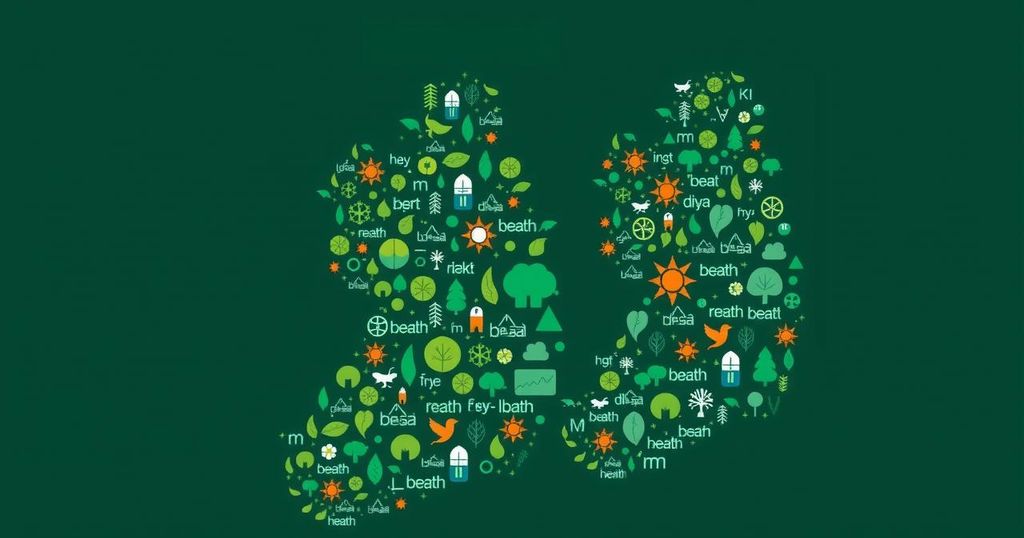Irish Researchers Launch Major Study on Climate Change’s Impact on Maternal and Child Health

Irish researchers from Trinity College Dublin have secured a €3.3 million grant to study the effects of climate change on maternal and child health. The Global Heat Attribution Project (GHAP) will correlate climate data with 45 million birth records across Africa, Europe, and Latin America over three years. The goal is to assess the heat-related impacts on health outcomes during pregnancy, distinguishing between natural and human-induced influences on climate variability.
Researchers in Ireland have received a €3.3 million grant to study the impacts of climate change on maternal and child health. The initiative, led by Professors Cathal Walsh and Matthew Chersich from Trinity College Dublin, will utilize the Global Heat Attribution Project (GHAP) over three years to analyze the effects of heat exposure across Africa, Europe, and Latin America. By linking climate data with approximately 45 million birth records, the study aims to identify both natural and human-induced climate change effects on pregnancy outcomes.
The GHAP employs advanced statistical techniques to differentiate between natural climate variations and those changes attributable directly to anthropogenic influences. This collaborative effort will encompass various experts dedicated to exploring the specific ramifications of extreme heat on pregnant women and children, a growing public health concern that warrants increased attention.
Professor Chersich highlighted the extreme conditions of modern climates, stating, “Each warm season sets new temperature records, heatwaves expand in frequency, intensity, and duration and more parts of the world become ‘unworkable’ and even ‘unliveable.'” The project will harness extensive datasets to assess the adverse health impacts of heat exposure during pregnancy, thereby capturing a more accurate picture of climate change’s toll on maternal health.
In addition, Professor Walsh noted that the GHAP is significant for its innovative approach to climate-health research, emphasizing the breadth of its geographical scope and the potential for actionable insights to inform health policy. This project is part of a broader initiative funded by the Wellcome Trust to delineate the distinct health impacts of climate change, thus facilitating a more nuanced understanding of its public health implications.
As climate change poses escalating challenges, this research aims to generate comprehensive data that could lead to improved monitoring systems and strategic interventions to safeguard maternal and child health against climate-related adversities.
This collaboration marks a pivotal moment in the nexus of climate science and public health, aiming to elucidate the burden of climate change on health by bridging the gaps in current modeling methods that often conflate natural variability with climate-induced variations.
The GHAP project signifies a crucial step toward a more detailed understanding of the detrimental effects of climate change, and through its transdisciplinary nature, it holds promise for developing informed responses to this pressing global challenge.
The research initiative seeks to address an urgent public health concern amidst rising global temperatures and increasing climate-related phenomena. Historically, the health impacts of climate change have been difficult to quantify due to inadequate data and methodologies that fail to distinctly separate variances caused by natural occurrences and those resulting from human activities. With climate change projected to exacerbate extreme weather events and heat exposure, particularly in vulnerable populations, this study emerges as an essential effort to evaluate its implications specifically for maternal and child health. Initiatives like the Global Heat Attribution Project (GHAP) aim to fill existing knowledge gaps and enhance the understanding of how such environmental factors affect health outcomes.
In conclusion, the Global Heat Attribution Project represents a significant advancement in research aimed at understanding the links between climate change and public health. The collaboration between Irish researchers and various global partners exemplifies a concerted effort to measure and address the health impacts of climate-like exposure. By linking vast datasets on births and weather conditions, the project endeavors to inform effective public health strategies and policies, ultimately striving to mitigate the adverse effects of climate change on vulnerable populations. As extreme climate events continue to rise, this research could prove invaluable in safeguarding maternal and child health in an increasingly uncertain future.
Original Source: www.imt.ie






